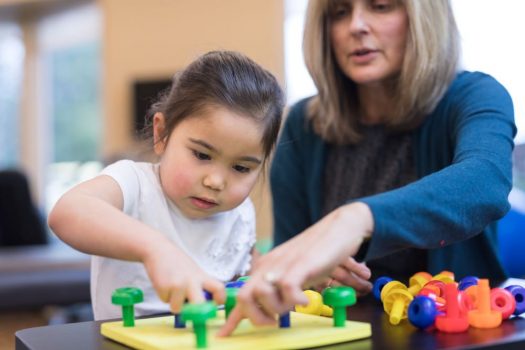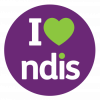Jack is four years old, and before he and his family began working with Marie-Eve, one of our senior occupational therapists, he had significant delays across all areas of his development. His parents noticed that his physical skills, his language and communication, as well as his social skills and self-care skills were all limited, and not developing at the same rate as other children the same age.
“This young man had no intelligible speech, limited interest in other children, played by himself the same activity over and over, struggled with his motor skills and had meltdowns daily,” Marie-Eve says.
Without intervention, Jack’s chances of developing meaningful and lasting friendships and relationships would be limited, and his options for living independently and securing employment later on in his life would narrow.
However, Jack’s family sought help from Ability Action Australia, knowing Early Childhood Intervention services would help their little boy develop the skills he needs to take part in everyday activities.
What is early years occupational therapy? OT in early intervention for children
Early intervention is specialised support available for both children and adults (less often), aimed at reducing the impact of a person’s impairment on their functional capacity by providing support at the earliest possible stage.
This type of support is also intended to benefit a person by reducing their future support needs. A person can meet the early intervention requirements if they:
- Are living with a disability, such as physical or intellectual, that is likely to be permanent
- Have a developmental delay and are likely to benefit from supports
Children under 9 years of age only need developmental delay to enter the early childhood approach NDIS program – they do not need a diagnosis, such as permanent disability.
Early intervention focuses on six key areas of a child’s development: Motor skills (fine and gross); communication and language; self-care (ability to acquire independence); social and interpersonal relationships; cognition; and emotional regulation.
OT in early intervention for children addresses these developmental areas, supporting healthy development and preventing developmental delays. It can help children increase their engagement in everyday activities, such as self-help tasks, participation at school, and playing.
What is early intervention, and how occupational therapy in early childhood can help your child
Early intervention occupational therapy for children with a disability can be life changing, both for participants and their families. At Ability Action Australia, our therapists help participants reach important developmental milestones, and cultivate new skills needed to support their daily life and acquire independence.
Our therapist Marie-Eve’s work with Jack over the past few months has improved his life, and that of his family, significantly. She used play-based and developmental approaches to develop his joint attention, a foundation skill that allows him to stay focused and engaged. The play approach was also used to develop his communication and social skills and he now has friends.
“He interacts with others and participates in group activities, which he did not do before. During our sessions, this delightful boy has learnt about taking turns, sportsmanship, flexible thinking and perseverance when things are challenging. He also improved his motor skills, particularly his school readiness skills. We are still working hard on pencil control but he is getting better each session!”, Marie-Eve reveals.
How does early intervention work?
Childhood early intervention is a proactive approach to support children with a disability or developmental delays. Identifying and developing a support plan early in a child’s life can help foster their growth and wellbeing. Ability Action Australia offers a range of services, including early intervention occupational therapy and early intervention speech pathology, to promote a child’s development.
One of the biggest benefits of early intervention is the creation of a tailored plan designed to provide timely and personalised support to each child. The aim of these plans is to address developmental areas, prevent developmental delays and increase engagement in everyday activities.
Effective childhood early intervention programs involves collaborating with the participant, their family and support network including health professionals, and educators. Together, they work with the participant and their family to create and enact a tailored development plan that not only addresses the immediate needs of the child’s development, but allows them to develop and reach their full potential.
Why is early intervention important? A collaborative approach
Early intervention involves collaboration between the therapist and the family, as well as a child’s educators and other support people. The therapist will work to educate each on how best to support the child.
With Jack, collaboration with his parents has been key to improving his overall quality of life at home. Marie-Eve provides strategies to support Jack’s emotional and sensory regulation and, as a result, the frequency and intensity of his meltdowns have both decreased.
“I also worked with the parents on a routine-based approach and our little man has developed his independence with activities of daily living like dressing, eating, toileting and sleeping,” she says.
Often Marie-Eve will also work with other allied health clinicians such as speech and language pathologists, physiotherapists, psychologists, and behvaiour support practitioners, all of whom work in collaboration with a medical team that can include a GP and a paediatrician.
Does a child need to have a diagnosed condition to be eligible for early intervention?
Children under 9 years of age only need developmental delay to enter the NDIS early childhood approach – they do not need a diagnosis, such as permanent disability.
My child has already started school. Is it too late for childhood early intervention?
Early intervention will give your child the best opportunity to progress, but it is never too late to start to change things. Brain development goes on into early adulthood, so even if your child is not diagnosed until they start school, it is not too late to make a huge difference in your child’s development.
Our team provides OT in early intervention for children. We focus on intervening early to support your child with their developmental milestones.
If you would like further information or to speak to us, please contact our friendly concierge service on 1800 238 958 or complete the request contact form and we will contact you at a time that suits you best.
What if my child is older than 9?
While childhood early intervention programs specifically apply to children younger than 9 years old, our multidisciplinary team is also experienced in supporting children and adolescents that are accessing support through the NDIS.
Reach out to Ability Action Australia to find out more about our therapy, positive behaviour and employment services designed to support children with a disability.
Where to learn more about early intervention
If you believe that your child could benefit from early intervention speech therapy, occupational therapy or another early intervention service, contact our friendly concierge team on 1800 238 958 or complete the request contact form and we will contact you at a time that suits you best. .


